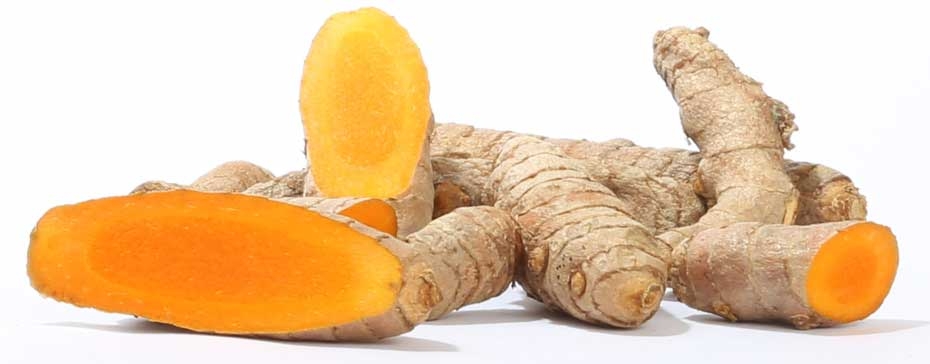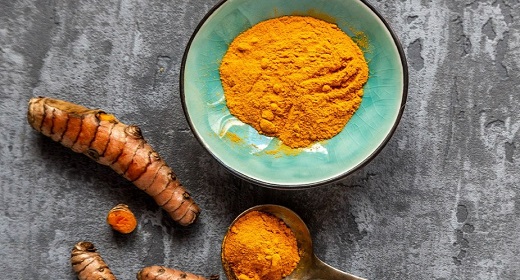by Merriam Ferrer: Turmeric is one of the most popular supplements in the UK thanks to its anti-inflammatory effects…
In this article, we look at the history of the remarkable plant and how you can achieve the best results from taking a turmeric extract.
What is turmeric?
The turmeric plant (curcuma longa) is a herbaceous plant of the ginger family. The original home of the plant is unknown but it is thought to be native to tropical areas of either the Indian Subcontinent or Southeast Asia.
The plant requires warm temperatures and plenty of rainfall to grow. It grows to a height of more than three feet, has large green leaves and is notable for its thick tuberous roots and rhizomes which are harvested to produce the popular spice.
History of the turmeric plant
Fresh turmeric root has been used in India for centuries in cooking, traditional medicine, religious practices and even as a cosmetic. It was also used in ancient Chinese medicine and as a pigment to dye the robes of Buddhist monks.
The root was known to westerners as early as Marco Polo’s 13th-century journey to Asia, but the potential was not recognised until the 20th century.

The roots are harvested every year, then boiled and ground to produce the familiar yellow turmeric powder that is used as a flavouring and colouring agent in food.
Best known for the warm, earthy flavour and the golden tint it lends to curries and other South Asian dishes, turmeric has also been used medicinally for thousands of years.
What is curcumin?
Curcumin is the primary active ingredient in turmeric, together with demethoxycurcumin and bisdemethoxycurcumin.
These compounds, known as curcuminoids, are natural aromatic organic compounds (polyphenols) which are responsible for the turmeric root’s golden colouring.
Curcumin forms only 3% of turmeric1, meaning that easy-to-swallow curcumin supplements are far more effective than eating turmeric powder.
What are the health benefits of turmeric?
Turmeric supplements are becoming a popular choice for athletes and people with joint conditions. The amount you take will depend on how well your body reacts to the active ingredient, curcumin, which is now recognised as a powerful anti-inflammatory2. Multiple studies confirming the health and fitness benefits are making it one of the UK’s best-loved supplements
Scientists have made research into the effects of curcumin a priority, with 36 published clinical studies focused on FutureYou’s patented formulation alone.
What is turmeric good for?
Various studies have found that curcumin:
- is a natural, highly effective anti-inflammatory3. Many chronic conditions are caused or exacerbated by inflammation, including arthritis and heart disease.
- can play a role in supporting and maintaining healthy and flexible joints.4
- may help with normal muscle recovery after high-intensity exercise5.
- is a powerful antioxidant2. Antioxidants help to protect cells from damage caused by the environment or as a by-product of normal metabolism.
- can reduce delayed onset muscle soreness (DOMS)6.
- can help to improve memory and mood in people with mild, age-related memory loss7.
Furthermore, studies conducted with elite athletes have shown that curcumin aids muscle recovery after high-intensity exercise5. That allows for better training and improved performance over time.
Turmeric tablets, curcumin capsules and easy-to-swallow extracts are growing in popularity thanks to international press coverage of positive studies.
Although these products are increasingly popular, the benefits of curcumin are difficult to obtain because it is not water soluble, and the body breaks it down before beneficial compounds can be absorbed. After two hours in the stomach, more than 98% of the curcumin is destroyed8.
How to take turmeric
Curcumin forms only 3% of turmeric1, meaning that easy-to-swallow supplements are far more effective than eating turmeric powder.
You should choose a turmeric supplement that is highly bioavailable so that your body can absorb more of the beneficial curcumin – typically curcumin is difficult to absorb, and you can only obtain benefits if it reaches your bloodstream8. A more bioavailable supplement also means that you can achieve positive effects with less turmeric while reducing the chances of experiencing side effects.
There is clear evidence for the effectiveness of curcumin (the active ingredient naturally present in turmeric) in a wide range of clinical applications 1,2. However, curcuminoids are not easily absorbed by the body in their raw state – they are not ‘bioavailable’.
The primary reason curcuminoids are poorly absorbed is that they are not soluble in water. They are also poorly soluble in lipophilic – fatty – solvents. Many supplements on the market have not addressed the issue of bioavailability and are therefore less effective because the body will break down 98% of the curcumin in the supplement after two hours in the stomach.
Foods rich in turmeric
In Indian food, turmeric is cooked with animal or plant fats such as butter or coconut oil. In traditional Indian medical use, turmeric is often diluted in warm milk. Putting turmeric into a lipolytic – or fatty – matrix like this provides the means for the active ingredient curcumin to be absorbed by the body.

Indian and South-East Asian cuisines commonly include turmeric. The root is used to lend its golden colour and warming flavour to curries, dhals, soups, rice dishes and more. Today, it has even become popular to include it in smoothies or to eat it with scrambled eggs.
Does turmeric interact with medications?
Many people wonder about the compatibility of turmeric/curcumin supplements with anticoagulants and antiplatelet agents.
Anticoagulants and antiplatelet agents are frequently used for the prevention and treatment of a wide range of cardiovascular and cerebrovascular diseases. Warfarin (commercialised as Coumarin®) is the most widely prescribed anticoagulant in the UK9. These medications are more likely than any other to interact with herbal supplements and medicines10.
Theoretically, curcumin may increase the effects of anticoagulants and antiplatelet agents – possibly increasing the risk of bleeding – because in vitro and animal studies have shown that curcumin can have an anticoagulant effect11.
If you are taking any medication or preparing for a medical procedure, you should consult your doctor or pharmacist before taking any food supplement. Every person is different and will respond in their own way to a food supplement. If you begin feeling unwell, stop taking the food supplement and continue with the medication.
Nevertheless, you can be confident that there is data from patients that supports the conclusion that curcumin and warfarin can be taken together12. You can read about some of the studies on our dedicated Knowledge Centre page.
How much turmeric should I take?
Every person is different. Your body will metabolise some compounds very well and may struggle with others. For this reason, finding the right dose of a supplement is not an exact science.
You should begin by taking the recommended dose of your chosen turmeric supplement. If you would like to take it easy on your stomach you could try starting with a smaller dose and building up to the recommended amount over time.
Ideally, you only want to absorb enough curcumin to have the effect you are expecting, and no more. If you experience unwanted side effects when taking turmeric, you should stop immediately and talk to your doctor or pharmacist before resuming.
The best turmeric supplements
Curcumin forms only 3% of turmeric1, meaning that easy-to-swallow supplements are far more effective than eating turmeric powder.
A good supplement might consist of up to 95% curcuminoids. However, it is not the amount of the active ingredient that is most important factor. If you’re looking for the best turmeric supplement on the market, you need to find out whether your chosen product is easy to absorb (bioavailable).
Curcumin is difficult for the body to absorb in its raw state, primarily because it is not soluble in water. It is also poorly soluble in lipophilic – fatty – solvents8. Many supplements on the market have not addressed the issue of bioavailability and are therefore less effective since if the curcumin isn’t absorbed it won’t do any good.
Black pepper
To address the issue of bioavailability, many supplements do now contain black pepper. It is thought that black pepper improves absorption by inhibiting the natural processes that prevent pharmacological compounds from accumulating in the body, by possibly:
- Inhibiting cellular efflux mechanisms such as P-glycoprotein (P-gp). This is a membrane transporter used by cells to secrete compounds such as chemotherapeutic agents and other drugs. In this case, decreases the secretion of curcumin absorbed in the intestine13.
- Inhibiting glucuronidation, a process that makes substances/drugs more water soluble so they can be easily eliminated from the body14.
The effect of long-term use of black pepper is unknown, but it could have unwanted side effects. These might be caused by inhibiting the secretion of pharmacological compounds and other unwanted substances from the body.
Liposome
You can also find curcumin in a liposome/micelle form where the active ingredient is encased inside a lipid cavity. This formulation has only been used in two human studies (one in healthy volunteers and one in moderately hyperlipidemic individuals). These studies focused on the examination of concentration of curcuminoids in serum but not any therapeutic effects. In fact, the study on hyperlipidermic patients didn’t show any effect at all, whereas other curcumin formulations have shown some therapeutic effect15,16.
Phytosome
By contrast, a scientifically proven formula that incorporates phytosome technology is able to boost absorption in a natural way by mimicking the intake of turmeric with food. A phytosome is a lipolytic complex of a natural active ingredient (such as curcumin) and lecithin17. Numerous studies covering 10 different areas including eye health, joint health, rheumatoid arthritis and pain relief, conducted in healthy volunteers and patients, have validated the effectiveness of the lipolytic formulations.
What does this mean?
The effectiveness of a curcumin supplement depends on achieving greater absorption using the right methods. Finding a ‘natural’ way to improve bioavailability (such as phytosome technology) is important as it is less likely to cause tolerability issues or unknown side effects with long-term use.





















































